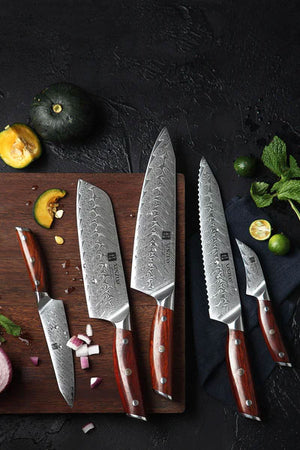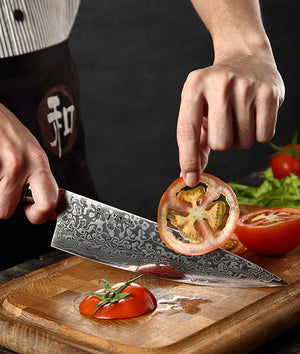Steel Frozen Food Knives
Frozen food knives might not be one of the most common, mainstream types of knives that everyone has in their kitchen, but that doesn’t mean that it doesn’t have its place. Whether you’re a professional or an amateur, if you deal with frozen food a lot, then a frozen food knife is an absolute must.
But, what makes a knife for cutting frozen food different from any other kind of knife? Well, it’s all about the fact that... Show More
Frozen food knives might not be one of the most common, mainstream types of knives that everyone has in their kitchen, but that doesn’t mean that it doesn’t have its place. Whether you’re a professional or an amateur, if you deal with frozen food a lot, then a frozen food knife is an absolute must.
But, what makes a knife for cutting frozen food different from any other kind of knife? Well, it’s all about the fact that frozen food is incredibly hard, difficult to cut through, and risky when it comes to slipping and inuring yourself.
That’s why having a knife for cutting frozen food is essential. We’re going to tell you exactly what makes frozen food knives different from ordinary knives, as well as exactly what knives that cut through frozen food can be used for – we’re talking about specifics.
Properties of a Frozen Food Knife
When it comes to knives to cut frozen food, they can come in all shapes and sizes. But here are some general properties that are true for most, if not many, of them.
- Thick Blade: A thick blade is essential for strength and stability, as it can be very difficult to cut through frozen food.
- Serrated Edge: Often, they have serrated edges as this helps with grip and it also prevents slipping, as frozen foods can be smooth.
- Blade Length: The length of a knife to cut frozen food can vary depending on what it’s meant for. Longer ones are used for bigger foods (and are more versatile), and short ones for smaller items.
- Handle: It’s essential that the handle can help give you a comfortable and firm grip, so this has to do with your preference.
- Maintenance: Bone and frozen food cutting knives tend to require regular sharpening, as ice and frozen foods can be fairly abrasive on the edge of a knife.
- Material: Blade materials can vary, but they generally need to be very strong. However, because they’re dealing with frozen food, it’s also important that they’re resistant to corrosion. This is why you’ll often find high-carbon blades, stainless steel frozen food knives, or some kind of composite materials.
Uses of a Frozen Knife
It’s pretty simple – frozen food knives are used to cut frozen food. But here are some specific things they’re good at working with:
- Dicing Frozen Vegetables: Things like onions, peppers, and carrots, especially.
- Slicing Frozen Meat: Easily slice frozen chicken, steak, or roasts.
- Portioning Frozen Fish: Conveniently portion frozen fish fillets or other frozen seafood.
- Trimming Frozen Pastries: Trim and cut frozen pastry dough or pie crusts.
- Break up Frozen Bulk Food: Use frozen food knife to break up a large block of frozen food into smaller, more manageable pieces.
- Chop Frozen Fruit: Chop up frozen fruits for a smoothie or baking.
Buy Your Own Frozen Food Knife Today
Browse the Bamboo Guy’s selection of knives and find yourself a frozen food knife for your kitchen.
Show Less
-
Original price $44.95Original price $44.95 - Original price $44.95Original price $44.95Current price $29.50$29.50 - $29.50Current price $29.50| /
Xinzuo B35 German Stainless Steel Sandalwood Kitchen Frozen Food Knife
In stockXinzuo B35 Kitchen Frozen Food Knife Features: German Din 1.4116 Stainless Steel 56-58 HRC Rockwell hardness Edge angle: 30 degrees Rust resistant...
View full detailsOriginal price $44.95Original price $44.95 - Original price $44.95Original price $44.95Current price $29.50$29.50 - $29.50Current price $29.50| /Save 34% Save % -
Original price $63.95Original price $63.95 - Original price $63.95Original price $63.95Current price $42.50$42.50 - $42.50Current price $42.50| /
Xinzuo X02 Supreme Series 8" Frozen Food Knife German 1.4116 -x50crmov15 Steel - Full Tang
In stockXinzuo Supreme Series - Precision, Durability, and Timeless Craftsmanship Crafted from premium German 1.4116 stainless steel (X50CrMoV15), the Xinz...
View full detailsOriginal price $63.95Original price $63.95 - Original price $63.95Original price $63.95Current price $42.50$42.50 - $42.50Current price $42.50| /Save 34% Save %










